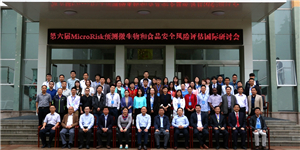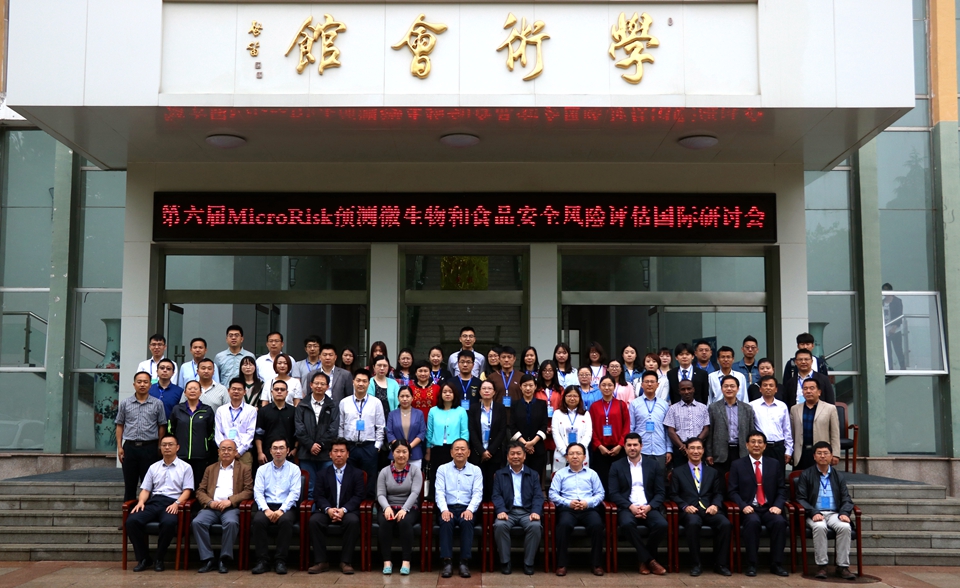The 6th MicroRisk International Symposium on Predicting Microbiological and Food Safety Risk Assessm
2018-05-23 11:23:53 views:0

On 19 to 20 May, the 6th MicroRisk International Symposium on Microbiological and Food Safety Risk Assessment, jointly organized by Qingdao Agricultural University(QAU) and Qingdao Science and Technology Association, was held at QAU. Wang Jun, Vice Chairman of Qingdao Science and Technology Association, Zhu Lianqin, Vice President of QAU, Dr. Wang Ruru, Risk Assessment Department of China National Food Safety Risk Assessment Center, Zhao Jinshan, Director of School Science and Technology Department, Guan xiao shu cheng , professor of Hokkaido University, Japan, Professor Wu Dehuan of Korea National Gangwon University, Professor PJ Cullen of the University of Nottingham, Professor Dong Qingli from the Shanghai University of Science and Technology, Wang Baowei, Chairman of the Qingdao Food Science and Technology Society, Professor, Dean of the School of Food Science and Engineering in QAU, Professor of the Qingdao Characteristic Crop Industrialization Association, Professor Wang Shiqing from QAU and other experts attended the meeting. The seminar was hosted by the Food College of Qingdao Agricultural University, Qingdao Food Science and Technology Society, Shandong Modern Agriculture Industrial Technology System Poultry Industry Innovation Team, Qingdao Characteristic Crop Industrialization Association, and Qingdao Food Quality and Safety Risk Assessment Engineering Research Center, coordinated by Qingdao Palisade Asia Pacific Branch (PALISADE ASIA-PACIFIC PTY LIMITED) and Qingdao Haibo Biotechnology Co., Ltd. The opening ceremony was held in the first lecture room of the school academic hall.
Zhu Lianqin delivered a speech to the conference on behalf of the school and extended a warm welcome to heads and experts. He said that for a long time, the party and the state have attached great importance to food safety. As an agricultural university, the school has always made it an important task to promote food safety and people's health. After years of development, schools have gathered a large number of experts and scholars who have undertaken a number of national and provincial research projects in dairy products, animal products, quality and safety of grain and oil products in the field of food quality and safety risk assessment. They published more than 80 research papers in international authoritative journals such as Food Chemistry and Food Control. In 2011, the school cooperated with enterprises to create Hairun Agricultural University Testing Co., Ltd., which has the world's most advanced agricultural product testing equipment and testing technology, and provides FDA-certified offshore testing and training for Qingdao agricultural products enterprises. This cooperation model has become a sample of ‘Double Creation’ and the cooperation between industry academia and research institutes has been fully affirmed by provincial and municipal leaders.
Wang Jun, vice chairman of Qingdao Science and Technology Association, delivered a speech. He pointed out that this seminar invited top experts from the industry to conduct academic exchanges and share the latest research results of predictive microbiology and food safety risk assessment, and at last build an international exchange platform, open the door to international exchanges in the field of food safety, broaden our horizons and promote the development of China's food safety strategy. The meeting held in Qingdao and is of great significance for upgrading and promoting the application of new technologies for Qingdao's international forecasting microbiology and food safety risk assessment.
Food safety is a major livelihood issue, social issue and political issue. General Secretary Xi Jinping repeatedly stressed that it is necessary to strengthen the food safety supervision work with "the most stringent standards, the most stringent supervision, the most severe punishment, and the most serious accountability." Foodborne pathogens are recognized as the world's greatest threat to food safety. Predictive Microbiology is a cross-disciplinary discipline that combines microbiology, chemistry, mathematics, statistics, and applied computer technology. It uses mathematical methods to describe the relationship between bacterial number changes and external environmental factors under different environmental conditions. Respond to relationships and predict the growth dynamics of microorganisms. The main purpose of predictive microbiology is to use mathematical models to quantitatively analyze the growth of microbial growth, enabling people to predict the growth and death of microorganisms without microbiological testing, providing an important guarantee for food safety. Food prediction microbiology has great application value in food shelf life, food safety prediction and management, and is a promising research field in food microbiology. The theme of this conference is “Predicting the Latest Research Progress in Microbiology and Food Safety Risk Assessment”, aiming to further strengthen academic exchanges, systemic control and prediction of foodborne pathogens, and realize the risk assessment of foodborne pathogens. Chemicalization, standardization, networking, and precision, further enhance China's food safety risk early warning capability and enhance the development level of this discipline.
The conference held a one-day academic report and exchange discussion. Experts and professors from Hokkaido University, Korea National Gangwon University, University of Nottingham, Korea, Kyung Hee University, Bayero University, Nigeria, and more than ten universities and research institutes in China attended the meeting. Wang Shiqing, head of the Characteristic Crop Industrialization Association of Qingdao, professor of the College of Food Science and Engineering of Qingdao Agricultural University, and Professor Sun Jingxin and Yang Qingli of QAU, respectively made speeches on the effects of atmospheric pressure plasma on peanut oil quality and peanut protein structure, and ultrasonic synergistic sodium hypochlorite on the large intestine, the effects of bactericidal effect and protein characteristics of the bacillus, and aflatoxin in the cake were removed by microbial solid-state fermentation. Teachers and students from the School of Food Science and Engineering attended the meeting.
On the afternoon of the 19th, the seminar also concluded a graduate forum. The graduate students who attended the conference presented their research results to domestic and foreign experts by PPT. The conference invited the present experts as judges and awarded the outstanding graduate students.

Qingdao Agricultural University
About QAU | | Research | International | Alummi | Study At QAUAddress:No. 700 Changcheng Road, Chengyang, Qingdao, Shandong, China. P.C. 266109
Web Design: News Center of Qingdao Agricultural University.




